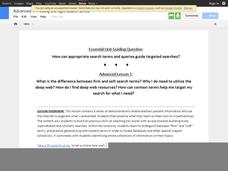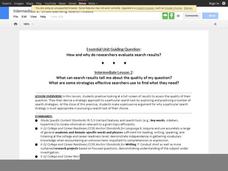Google
Surveys and Estimating Large Quantities
Looking for an estimation activity a bit more involved than the typical "guess the number of jellybeans in the jar" game? Here, learners use a picture to estimate the number of people at a large event, look for potential problems with...
Curated OER
Stochastic and Deterministic Modeling
Explore the difference between stochastic and deterministic modeling through programming. First have the class write algorithms for relatively simple tasks using pseudocode. Use the Python 2.7 program app to simulate Mendel's Pea Pod...
Google
The Law of Large Numbers and Probability
Learners investigate why theoretical probability doesn't always match reality. The activity involves using Python 2.7 (or Sage) to set up a Bernoulli Trial. It also involves setting up a spreadsheet to simulate the Birthday Paradox....
Curated OER
Social Studies: Essay Outline
Here is a resource intended for a social studies class, but great no matter the subject. It's a complete outline for an essay. It includes space to write ideas related to the thesis, supporting details, transition sentences and words,...
Curated OER
The Hobbit Reading Guide
Posted here are dozens of questions to present when reading The Hobbit. Questions for 19 chapters are available. Either give this guide to your class, or use it to help you develop appropriate, yet challenging material to explore each...
Curated OER
The Hobbit List 1 Vocabulary Worksheet
Review some of the challenging vocabulary as your class begins The Hobbit. Twenty vocabulary words are introduced in two exercises. In the first, learners answer questions using some of the target vocabulary. Then, in part two, they use...
Curated OER
The Hobbit: Vocabulary List 3 Worksheet
The Hobbit, J.R.R. Tolkien’s well-known fantasy, provides the words for two vocabulary exercises. Readers craft sentences using words from the text and fill in the blanks to make meaning out of a second series of sentences.
Curated OER
Odyssey List 1 Worksheet
As your class begins to read The Odyssey, present them with a two-page worksheet focusing on vocabulary. Although the reading selection is not specified, twenty words are introduced on these pages. Example vocabulary words include...
Curated OER
Homer’s Odyssey Reading Guide
Looking for a list of reading questions to use with The Odyssey? Provided here are dozens of questions (although certain sections are left out). Use these questions to create your own reading guide for the famous epic poem.
Curated OER
Macbeth: Act IV Study Questions
The value in this Macbeth study guide is that it asks readers to not only chart events, but to also consider the significance of those events. The worksheets could be used as preparation for a full class discussion or the basis or a...
Curated OER
Classical Dramatic Structure: Resolving a Character's Conflict
How does plot drive a play? Show this 20-slide presentation to describe the different parts of a plot. Basic vocabulary terms are included like climax, turning point, rising action, and denouement. Present this resource before reading a...
Curated OER
Tension: Creative Writing
“Desire + Danger = Tension.” Thus begins a PowerPoint that details how to create tension and maintain the reader’s interest in a story. Although text-heavy, the color-coded slides model how the D + D = T formula functions and the...
Curated OER
Writing Dialogue: Putting a Voice on the Page
Dialogue can really make or break a piece of writing. Help your creative writers craft thoughtful, effective dialogue that advances the plot and develops their characters. One example is provided, but consider adding a few more slides to...
Curated OER
"Forms" of Poetry
Poetry isn't all sonnets and rhyming couplets! Introduce your class to three fun types of poetry: shape poems, acrostic poems, and diamante poems. Each type is explained, and an example is provided. Challenge your class to write one in...
Curated OER
Verbals: They look like verbs...but they're not!
Did you know there are three types of verbals? Do you even know what a verbal is? Provide your class with this brief introduction! Participles, infinitives, and gerunds are all introduced, and examples are given. Pair this with a...
Curated OER
Indefinite Pronouns
What type of pronoun is the word someone? What about something? These words (among others) are indefinite pronouns. Use the 14 slides included here to help your class better grasp singular or plural indefinite pronouns. Examples are...
Curated OER
Demonstrative Pronouns
What is a demonstrative pronoun? Help can your class recognize demonstrative pronouns in written work, and it might help them write better! The first three slides introduce the topic and give examples, while the last two offer practice...
Google
Advanced 2: Understanding Search Results
Effective researchers use a variety of techniques to find what they need online. Pupils who complete the activities listed here should already have an arsenal of strategies for searching. They will learn about and practice two new...
Google
Advanced 1: Picking the Right Search Terms
Many people, when searching online, will type in what they are looking for without much thought. But what's the next step, if they don't get the desired results? Careful selection of search terms. Your class can develop a sense for...
Google
Beginner & Intermediate 5: Evaluating Credibility of Sources
Convey how to determine appropriate and credible online sources with a series of three lessons. After completing the lessons, class members will know what kinds of sources to use, how to identify credible sources, and how tone and style...
Google
Intermediate 4: Searching for Evidence for Research Tasks
Online resources take many forms: blogs, search engines, news websites, documents, wikis. In order to conduct effective research, pupils should become familiar with different formats so that they can more easily choose suitable sites for...
Google
Beginner 4: Searching for Evidence for Research Tasks
Having a strong searching skill set can make a research project much easier and much for successful for pupils. Tackle finding evidence with the ideas included here. The ultimate goal is for class members to learn the stepping stones...
Google
Intermediate 2: Understanding Search Results
Teach your class some strategies for effective searching. Pupils should assess the whole results screen and then determine how to go forward with their searches. A table of strategies is included, as is a challenge. After they complete...
Google
Beginner 3: Narrowing a Search to Get the Best Results
Uncover new or more relevant information with the filtering tools in the top navigation bar. First, show your class the tools and demonstrate how to use a few. Next, give class members some time to apply what they have learned. They can...

























